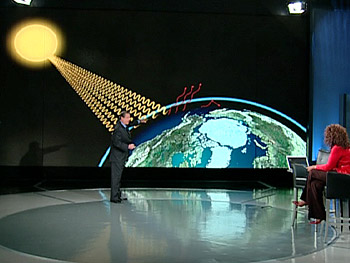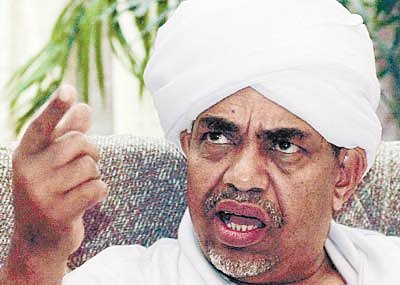"To my readers," an early publisher of the great French newspaper Le Figaro once remarked, "an attic fire in the Latin Quarter is more important than a revolution in Madrid." There could hardly be a better characterization of the problem of Darfur. It's incredible that most of the Western world is aware that genocide (or, to split hairs with the UN, mass-level massacre) is occurring there and yet the most common response is a shrug of the shoulders, a "But what can we do?" attitude which implies the only thing that can be done is nothing.
The situation has actually become much worse than this. A myth about the genocide has been crafted and deployed by large parts of the European and American intellectual and political communities. The myth has two parts - one dealing with the cause and the other the effect of the Sudanese genocide. The cause element of the Darfur myth maintains that the widespread and active murder of, to date, somewhere close to half a million people is rooted in a secular cycle of drought, famine, and scarce resource. The effect part of the myth, while not identical to the lie being perpetuated by Khartoum (that no genocide, ethnic cleansing, or mass killing is occurring at all), runs parallel to it. It says that because the causes are secular nothing productive can be done to solve the problem in the near term.
When Villemessant, the former publisher of Le Figaro, made his remark about the relative importance of a local attic fire versus that of a distant revolution he was talking to the notion (as Walter Benjamin explained in his essay on storytelling) that information about the near has become infinitely more important than intelligence or wisdom of the distant. Today, the globalization of information has made this critically true. We have been convinced that in our "global village" everything affects everyone. So when something -- like genocide in Darfur -- doesn't seem to be affecting us there is an implicit assumption that it affects no one.
This at least was the operating assumption about Darfur in the earlier stages of the genocide, which is why there was hardly even a whisper about it in the media or in Washington (or the UN) until a few years ago. Today, however, after it's been proven beyond doubt that hundreds of thousands are dead and millions displaced, the argument of the myth has been forced to evolve. Al Gore's appearance on Oprah at the end of last November crystallized this. In his big screen Power Point-style presentation, Gore flipped to an animated slide of a lake receding then emptying. Oprah jumped in to point out that this receding lake was Lake Chad, confirming Gore's claim that the receding of the lake -- caused by global warming -- was one of the main causes of the "conflict" in Darfur. It's this argument that takes the Darfur myth and contorts so it can conform to the notion that every conflict is somehow stitched into a global quilt, and that to make positive regional change we need to change the entire world. In other words, it's the myth that Darfur is a cyclical "conflict" -- with no guilty persecutors but only a group of nearly equally innocent victims -- that makes it meaningful to Western audiences; it's only when tied to the hysteria of global doom, which screams that all of our attics are on fire, that the story gets sold in the media market.
It's this argument that takes the Darfur myth and contorts so it can conform to the notion that every conflict is somehow stitched into a global quilt, and that to make positive regional change we need to change the entire world. In other words, it's the myth that Darfur is a cyclical "conflict" -- with no guilty persecutors but only a group of nearly equally innocent victims -- that makes it meaningful to Western audiences; it's only when tied to the hysteria of global doom, which screams that all of our attics are on fire, that the story gets sold in the media market.
The trouble is that the genocide in Darfur neither was nor is caused by the cycle of drought, famine, and war which has characterized life in the frontier lands of Chad, Sudan, and Libya since there were people there. In past centuries, people of Darfur (as much as people of Chad and southern Libya) were equipped to deal with severe drought. Without the assistance of aid and relief organizations these people managed through nomadism and clan cooperation to outlast devastating drought and famine, even if it spelled death and disease for many. But today, even with availability of massive relief in the form of foodstuff, medicine, and fresh water, people in Darfur are dying -- being murdered -- on a scale never before seen in that region.
Further, at the outset of the drought and famine around 1990 there was a real possibility to nip the effects of the drought in the bud. It was then that a staple crop, sorghum, failed on account of insufficient rainfall. This didn't go unnoticed by international aid organizations and Western governments. The US, through USAID, stepped in and declared that it was prepared to offer up to 100,000 metric tons of food relief to Sudan in order to prevent the looming humanitarian disaster. The response from Khartoum? Denial. Both the minister of finance, Abd Al-Rahim Hamdi, and the minister of agriculture, Ahmad Ali, came out to publicly insist the crop was normal and all was well. The government then turned the tables on the West - or, more specifically, Israel -- aggressively refusing any form of relief or aid and saying that the government of Sudan was not in need of assistance "as antagonistic Zionist circles claimed." The famine, like the killing, was in fact an effect of the Islamist government and its policy of an ethnically and religiously pure Sudan.
But with the globalist goggles that Gore and many others are looking through it's impossible to see past the Sahel and Savannah to what's actually going on in Sudan. Half a million people have been murdered. Most recently, Khartoum came out to make not so much a threat as a strategic statement that if the International Criminal Court decides to issue an arrest warrant for President Omar al-Bashir (who was accused of genocide and war crimes by the ICC in July), Khartoum will respond with violence against the UN aid mission. Sudan expert Eric Reeves reported that the UN's head of mission in Sudan received the threat directly: "The government has conveyed to me that the issuance of an arrest warrant against President Bashir could have serious consequences for UN staff and infrastructure in Sudan." In Reeves' understanding this is a clear message from the government saying, "Seek to arrest our president and we'll unleash further hell on the aid personnel who protect Darfur's vulnerable civilian populations." Sudan's al-Bashir
Sudan's al-Bashir
And yet not only did the UN issue no response to an outright threat of violence against its aid personnel but neither the American nor international media even reported the story. Why? Because it's not a story of attic fire in a local quarter. Because it contradicts the notion that there is no real aggressor in Sudan; and instead of the morally equivocating portrait of al-Bashir and his government as victims of global weather, it paints him and Khartoum in a truer light: as running rampant on an unhidden and unabashed campaign of ethnic and religious cleansing.
The ultimate perversion manufactured by the Darfur myth is only beginning to emerge in the media. It's starting to bubble up in Sudanese and other African newspapers but is steadily finding its way into the Western academy, and it won't be long before it's becomes a cliché of the mainstream media. This idea is expressed in the false (and outrageous) dichotomy of "peace versus justice." The notion is that a West- or UN-led pursuit of justice in Sudan will only hamper peace, and only by negotiating with or placating the regime can the West or the UN end the atrocities. (See an example of "peace versus justice" here.)
Reeves, a professor of English who has studied Darfur for close to a decade (mostly on his own time and while battling Leukemia) breaks the dichotomy decisively: "It's not a choice between peace and justice, not if we are serious about meaningful peace: for it is precisely the relentless absence of justice and accountability (impunity) that has sustained violence in Darfur and will continue to do so if unaddressed."
To pursue justice the Darfur myth must be abandoned. However, given that today's media is more consumed by local "attic fires" than by distant history-making events like Spanish revolutions -- or Sudanese genocide - it's not clear this will ever happen. Further, the emergence of the "peace versus justice" sham plays perfectly into the notion that "peace" in Darfur is somehow about solving universal crises like global warming rather than about getting an armed majority to stop murdering its (relatively) unarmed minority.
All this said, the only hope for progress lies in leadership. The work of journalists like New York Times columnist Nicholas Kristof who regularly travels to Darfur to document the situation, can produce change precisely because Kristof is telling the story, providing an experience of the place. More importantly, however, is that the Obama administration has the ability not necessarily to change the situation in Sudan but to change the perception of Darfur in the American public consciousness. It's this top level leadership that has the critical ability not to invade or to cast sanctions but to make the Darfur genocide a reality in the minds of Americans so it might one day cease to be a reality in the lives of the Sudanese.